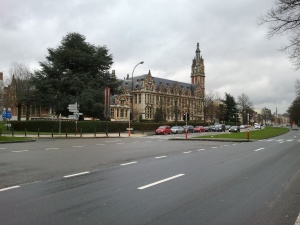Tagged: open source
Just For Fun – The Biography of Linus Torvalds
Did you know there actually is a book about the creator of the Linux kernel? And that it was published twelve years ago in 2001? I have used Linux-based operating systems for almost 8 years, and I must admit I never heard of such a book up to three months ago. I ordered it the minute I found out about it. It was a good choice :-)!
Just For Fun: The Story of an Accidental Revolutionary is about the life journey of the father of the Linux kernel — Linus Torvalds, but not only that. It is mostly written as an autobiography, with shorter sections between chapters from a co-author, a journalist, David Diamond (whose idea it was to write a book about Linus in the first place).
It starts with a short preface, a conversation between the two authors on a road trip Linus, his family, and David went on (their destination is an IKEA store in Los Angeles). During the trip, they talk about the book and Linus starts to explain a theory he has about the meaning of life — the law of Linus. The title of the book is in fact based on this theory (which is quite interesting).
Linus starts with describing the memories he has from his childhood in Finland with the same kind of wit you might know from his emails (the first chapter actually starts with: I was an ugly child.). He says, he doesn’t remember much of it, except when it comes to the computers he had. He spent a lot of time with his scientist grandfather, who introduced him to programming and let him use his computer. Linus did what any serious nerdy kid does. Loved maths, stayed indoors a lot, and programmed as much as he could.
The story continues to the times during which Linus got an extremely powerful (at that time) and also extremely expensive 386AT machine. He must have got a loan to be able to afford it. The things Linus did back in that time were basically only programming, sleeping, and eating pretzels. And of course the occasional snooker.
These were the early times and they certainly were not as easy as often portrayed by journalists. Even after the famous release announcement on the Minix’s news group, Linux was not an instant hit. It took quite a lot of hard work before it got any commercial attention, and even more work before Linux actually gained any commercial success.
Linus got a job at the University of Helsinki that allowed him to focus on developing Linux. He decided, he would like to turn Linux into a full featured operating system (which took a lot more work than he had expected). But after some time, he announced the release of Linux 1.0.0. Only this time it was not an email sent to a news group. The usual (and boring) email announcement turned into an event that took place at the university and attracted quite a lot of attention.
In the following chapters, Linus writes about his other early experiences with public speaking and his encounters with journalists coming to his house. Linus explains why he took the job at the Transmeta Corporation and also his decision to relocate from Finland to the US. He also mentions the stock grants he received from Red Hat and various other Linux companies (and why he refused to work for any of them).
Towards the end of the book, there are several essays on open source, intellectual property, copyright, and the future of Linux presenting his own opinions on these topics. Interestingly enough, Linus mentions, that he expects the Linux kernel to power some sort-of handheld devices for reading email in the future (the smart-phones that are common today were certainly not yet that ubiquitous in early 2000s).
This book was a quite an interesting read for me. It is funny and casual, so it reads quite fast. And if you actually use Linux or even participate in the community that surrounds the Linux kernel, I certainly recommend picking it up!
If you liked this post, make sure you subscribe to receive notifications about new content on this site by email or a RSS feed.
Alternatively, feel free to follow me on Twitter or Google+.
FOSDEM 2013
This year, I was given the opportunity to go to Brussels to attend the best Free Software and Open Source event in Europe, also known as The Free and Open source Software Developers’ European Meeting (FOSDEM). It is one of the biggest open source conferences in Europe; it is a place where the developers of many open projects from around the world come together to have a beer and to talk about their progress. Over 5000 visitors come to Brussels every year to see hundreds of talks organised to dozens of tracks. It was actually my first time at an even this big. And it was great, indeed!
The main reason for our trip to Brussels was to present our project called LNST in the Test and Automation Devroom. Unfortunately, due to the travel arrangements, we couldn’t make it to the second day of the conference. Nevertheless it was a great experience. Saturday was crammed with great talks and they all seemed to happen at the same time! Hopefully, the organisers managed to record most of them and will make them available online soon.
Friday’s Beer Event
The conference actually started on February 1st by the beer event in probably the largest pub I have ever seen — the Delirium Café. It had at least 3 floors, all of which were full of geeks including a part of the street in front of the pub. There was a really large variety of beers to chose from with alcohol content going up to (and sometimes probably even over) 10%. I personally liked Belgian beer. It is different from that we are used to in Czech Republic, but in a good way.

Delirium Café in Brussels (src: http://deliriumcafe.be)
Saturday’s Talks
The official event was held at the Université Libre de Bruxelles (or ULB) campus which is situated in southern Brussels. The first talks on Saturday started mostly from 11:00, so there was some time to get yourself together if you had overdone it with the beer the previous day. The first thing we did was actually to get a coffee and a croissant. There was an improvised bar conveniently at the campus, which was really nice.
The first presentation we decided to see was about the architecture and the recent developments of GNU/Hurd from Samuel Thibault in the Microkernels and Component-based OS devroom. Samuel explained that Hurd is designed to provide as much freedom to regular users as possible as the root has (accessing hardware being the notable exception). For example, Hurd allows users to build and use their own TCP/IP stack. Due to the modularity of the kernel, you can replace the majority of the OS without even asking.
Then we decided to move to the Virtualisation track to see a talk about virtual networking. We got there late, and I must admit, that I really didn’t understand the concept. On the other hand, what was really nice were the stands in building K and AW. They were usually overflowing with swag to take (or buy). Red Hat had a Fedora booth there with Jaroslav Řezník and Jiří Eischmann, giving out DVDs with Fedora 18 (apart from other things). I got the opportunity to try the new Firefox OS there. It looked okay, but only one of the four buttons the phone actually worked. I am sure it will do better next year :-).
Željko Filipin talked from 13:30 in the Testing and Automation Devroom about the way Wikipedia is tested, which was really interesting. They use a set of tools called Selenium to automate web browsers. It provides Ruby API to manipulate all the major browsers. This is very helpful during the testing process, as it allows scripting unit and regression tests easily.
My talk about the Linux Network Stack Project was scheduled right after that. I was really nervous about it, because it was my first serious public speaking (and in English). I made it through without passing out, so I guess it went well. Still, I am not sure whether I made everything as clear as I possibly could. The devroom was very well organised (or at least that was the impression I got when I entered) thanks to R. Tyler Croy and others who were running it.
Slides: You can download the slides I used for the LNST presentation here.
The last two talks I saw there were about the Linux kernel, both were part of the Operating Systems main track. In the first one, Thomas Petazzoni from Free Electrons explained the challenges of ARM support in the kernel and described how Linux deals with supporting different ARM-based SoC’s. The very last talk we attended was from the maintainer of I2C subsystem in the Linux kernel — Wolfgang Sang. Wolfgang was talking about what it takes to be a kernel subsystem maintainer. He explained how a person becomes one and then focused mainly on his own experiences and how he prefers to do it.
Apparently, RMS was there attending the conference, but unfortunately I didn’t see him. $*#.! Well, maybe next time.
Brussels
There was no much time left, but we managed to get a while in the evening to go buy some chocolate and have a look through the city. To me, Brussels is something in the middle between Prague and London. They write everything in two languages — French and Dutch, but they seem to use French a lot more. If you are hungry there, you can get a variety of things from Thai to Spanish, Italian, and Mexican food. If you don’t know, where to go, I can recommend a great tex-mex restaurant called ChiChi’s. As always, you can get a whole lot of junk food from McDonald’s. There are a couple of instances of Starbucks in the city and an infinite number of other cafés to maintain proper caffeine levels :-).
Anyway, it was both a great conference and a really nice trip. I hope, I will be able to come next year as well!
If you liked this post, make sure you subscribe to receive notifications about new content on this site by email or a RSS feed.
Alternatively, feel free to follow me on Twitter or Google+.


